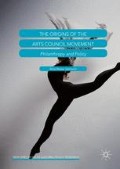Abstract
This chapter offers an analytical assessment of Keynes’s influence on post-war arts policy by examining the Arts Council of Great Britain (ACGB) as a policy model. It argues that both Keynes’s political philosophy as a Liberal and his underlying moral approach to government policy shaped his approach to arts policy. Two organizations with which Keynes was involved inspired his plans for the ACGB: the wartime Council for the Encouragement of Music and the Arts (CEMA) and the University Grants Committee (UGC). He was appointed chairman of CEMA in 1942, and as bursar of Kings College, Cambridge, knew about government funding of academic research. Two characteristics of the policy model—the notion of ‘distance’ from government and the emphasis on professional standards—both associated with Keynesian cultural thinking, are explored in this chapter.
Access this chapter
Tax calculation will be finalised at checkout
Purchases are for personal use only
References
Newspapers and Periodicals
Bell, Clive. 1939. A Ministry of Arts. The Statesman and Nation, October 14, 518–519.
Published Sources
Backhouse, Roger E. 2006. The Keynesian Revolution. In The Cambridge Companion to Keynes, eds. Roger E. Backhouse, and Bradley W. Bateman, 19–38. Cambridge: Cambridge University Press.
Backhouse, Roger E., and Bradley W. Bateman. 2006. A Cunning Purchase: The Life and Work of Maynard Keynes. In The Cambridge Companion to Keynes, eds. Roger E. Backhouse, and Bradley W. Bateman, 1–18. Cambridge: Cambridge University Press.
Bateman, Bradley W. 2006. Keynes and Keynesianism. In The Cambridge Companion to Keynes, eds. Roger E. Backhouse, and Bradley W. Bateman, 271–290. Cambridge: Cambridge University Press.
Brittan, Samuel. 2006. Keynes’s Political Philosophy. In The Cambridge Companion to Keynes, eds. Roger E. Backhouse, and Bradley W. Bateman, 180–198. Cambridge: Cambridge University Press.
Collini, Stefan. 2006. Absent Minds: Intellectuals in Britain. Oxford: Oxford University Press. 2007 paperback edition.
Goodwin, Craufurd. 1999. Art and the Market: Roger Fry on Commerce in Art. Ann Arbor: University of Michigan Press.
———. 2006. The Art of an Ethical Life: Keynes and Bloomsbury. In The Cambridge Companion to Keynes, eds. Roger E. Backhouse, and Bradley W. Bateman, 217–236. Cambridge: Cambridge University Press.
Gray, Clive. 2000. The Politics of the Arts in Britain. Basingstoke: Macmillan.
Griffiths, Dave, Andrew Miles, and Mike Savage. 2008. The End of the English Cultural Elite? The Sociological Review 56(1): 188–209.
Hetherington, Stephen. 2015. Arm’s-Length Funding of the Arts as an Expression of Laissez-Faire. International Journal of Cultural Policy. doi:10.1080/10286632.2015.1068766.
Hewison, Robert. 1995. Culture and Consensus: England, Art and Politics Since 1940. London: Methuen.
Hutchison, Robert. 1982. The Politics of the Arts Council. London: Sinclair Browne.
Keynes, John Maynard. 1972. Collected Writings of John Maynard Keynes, Vol IX. London: Macmillan and St. Martin’s Press. (Abbreviated as JMK 1972, Vol. IX)
———. 1982. Collected Writings of John Maynard Keynes, Vol XXVIII. Donald Moggridge (ed.), New York: Macmillan and Cambridge University Press. (Abbreviated as JMK 1982, Vol. XXVIII)
Madden, Christopher. 2009. ‘D’Art Report No. 9: Independence of Government Arts Funding. International Federation of Arts Councils and Culture Agencies. Available in Three Languages at http://www.ifacca.org/topic/independence-of-arts-funding-from-government/
Mill, J.S. 1981. Collected Works, Vol I, Autobiography. Toronto: University of Toronto Press.
Peacock, Alan. 1993. Keynes and the Role of the State. In Keynes and the Role of the State: The Tenth Keynes Seminary Held at the University of Kent at Canterbury, 1991, eds. Derek Crabtree, and A.P. Thirlwall, 3–40. New York: St Martin’s Press.
Sedgwick, John. 2000. Popular Filmgoing in 1930s Britain: A Choice of Pleasures. Exeter: University of Exeter Press.
Shattock, Michael. 1994. The UGC and the Management of British Universities. Buckingham: Society for Research into Higher Education and Open University Press.
Sinclair, Andrew. 1995. Arts and Cultures: The History of the 50 Years of the Arts Council of Great Britain. London: Sinclair-Stevenson.
Skidelsky, Robert. 2001. John Maynard Keynes: Fighting for Britain 1937-1946. vol 3. London: Papermac.
Smith, James Allen. 2010. Foundations as Cultural Actors. In American Foundations: Roles and Contributions, eds. Helmut K. Anheier, and David C. Hammack. Washington, DC: Brookings Institution Press.
Upchurch, Anna. 2004. “John Maynard Keynes, the Bloomsbury Group, and Origins of the Arts Council Movement,” International Journal of Cultural Policy 10(2): 203–218.
———. 2007. Vincent Massey: Linking Cultural Policy from Great Britain to Canada. International Journal of Cultural Policy 13(3): 239–254.
———. 2013. “‘Missing’ from policy history: The Dartington Hall Arts Enquiry 1941-47”. International Journal of Cultural Policy 19(5): 610–622.
Vipond, Mary. 1980. The Nationalist Network: English Canada’s Intellectuals and Artists in the 1920s. Canadian Review of Studies in Nationalism VII(1): 32–52.
Weingärtner, Jörn. 2006. The Arts as a Weapon of War: Britain and the Shaping of National Morale in the Second World War. London: Tauris Academic Studies.
Williams, Raymond. 1979. ‘The Arts Council’, Political Quarterly 50(2): 157–171.
———. 1983a. Culture and Society 1780–1950. New York: Columbia University Press.
Witts, Richard. 1998. Artist Unknown: An Alternative History of the Arts Council. London: Little Brown & Co.
Woolf, Leonard. 1960. Sowing: An Autobiography of the Years 1880–1904. London: The Hogarth Press.
Unpublished Papers and Theses
Bianchini, Franco. 1995. Cultural Policy and Political Strategy: The British Labour Party’s Approach to Arts Policy, with Particular Reference to the 1981-86 GLC Experiment. University of Manchester, UK.
Gray, Clive.1998. Oligarchy by Patronage: The Membership of the Arts Council Unpublished study. Leicester, UK: De Montfort University.
Author information
Authors and Affiliations
Copyright information
© 2016 The Author(s)
About this chapter
Cite this chapter
Upchurch, A.R. (2016). The Arts Council of Great Britain: Keynes’s Legacy. In: The Origins of the Arts Council Movement. New Directions in Cultural Policy Research. Palgrave Macmillan, London. https://doi.org/10.1057/978-1-137-46163-6_5
Download citation
DOI: https://doi.org/10.1057/978-1-137-46163-6_5
Published:
Publisher Name: Palgrave Macmillan, London
Print ISBN: 978-1-137-46162-9
Online ISBN: 978-1-137-46163-6
eBook Packages: Literature, Cultural and Media StudiesLiterature, Cultural and Media Studies (R0)

